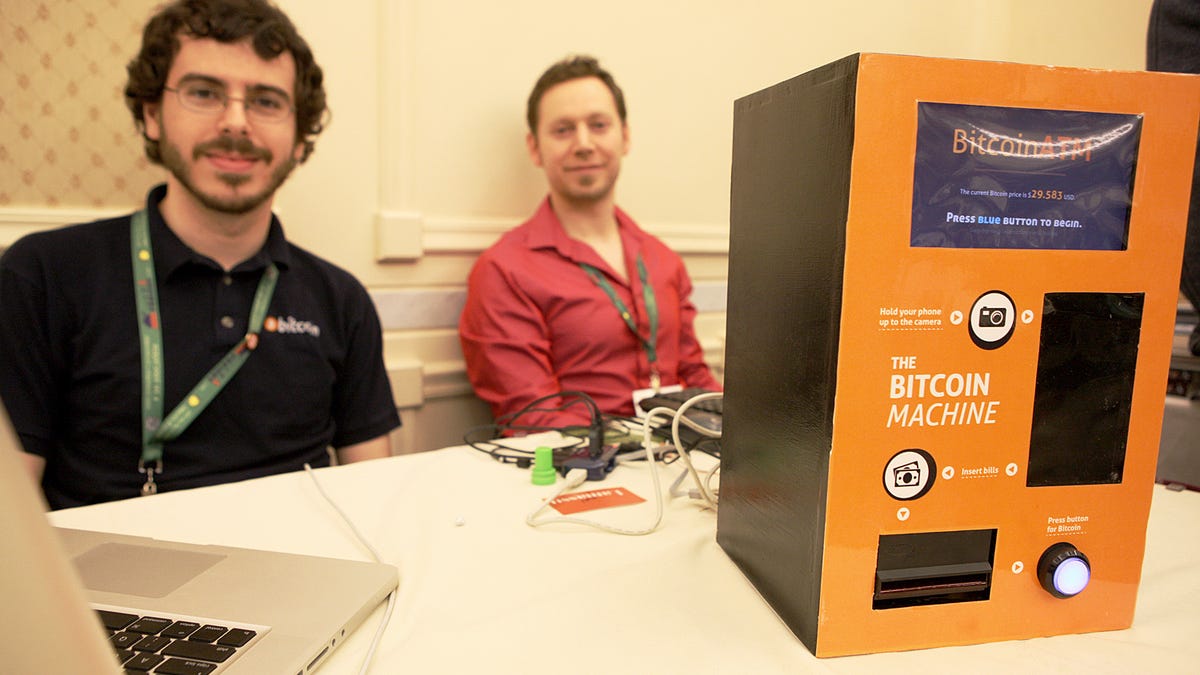Need Bitcoins? This ATM takes dollars and funds your account
New Hampshire entrepreneurs have created a dollar-converting anonymous Bitcoin ATM, which they hope to sell to bars, restaurants, and other retail locations nationwide.

NASHUA, N.H. -- Zach Harvey has an ambitious plan to accelerate adoption of the Internet's favorite alternative currency: installing in thousands of bars, restaurants, and grocery stores ATMs that will let you buy Bitcoins anonymously.
It's the opposite of a traditional automated teller that dispenses currency. Instead, these Bitcoin ATMs will accept dollar bills -- using the same validation mechanism as vending machines -- and instantly convert the amount to Bitcoins and deposit the result in your account.
"It's even easier than just using a regular ATM," says Harvey, 33, who demonstrated the device to CNET this weekend at the Free State Project's annual Liberty Forum. "You could probably do it in about five seconds. The thing that would take the longest would be the bill validator taking in the dollar."
Harvey and Matt Whitlock are partners in a New Hampshire-based venture, Lamassu Bitcoin Advisors, that's hoping to commercialize the ATM by selling to retail businesses, especially ones that also want to accept the decentralized alternative currency from customers.
"If we made these machines somewhere around $1,000 to $1,500 each, depending on the commission, they could be able to buy this and make it back within a reasonable period of time," Harvey says.
Bitcoin has gradually increased in popularity since it appeared in 2009, with WordPress saying last fall that it would accept it as a payment method, and a handful of retail businesses, including Cups and Cakes Bakery in San Francisco, following suit. The exchange rate now hovers around US$30 a coin, and about $300 million is in circulation.
The technology represents an easy way to transfer funds across national borders, a process that currently can be slow and cumbersome with wire transfers. Bitcoin is less risky for online sellers than accepting credit cards, which can be disputed by customers. While not truly anonymous, it can be relatively private -- and is far more difficult for the U.S. or other governments to trace.
Unlike modern currency, which can be brought into existence at the whim of politicians or a central bank, leading to each note being devalued, the number of Bitcoins is governed by predictable mathematical algorithms. That's made Bitcoin popular among libertarians and other activists skeptical of the Federal Reserve; the Free State Project accepts payment for its summer festival in Bitcoins, for instance. (The U.S. dollar has lost 96 percent of its value over the last century because of cumulative year-over-year inflation, according to federal government data.)
Harvey came up with the idea of a Bitcoin ATM when living in Tel Aviv and running an online guitar retailer, StompRomp.com, that accepted payments in the currency. He said accepting Bitcoin was more reliable and safer than dealing with charge-backs, credit card fraud, and "scam sales from certain Asian countries like Malaysia or Indonesia."
To obtain Bitcoins, people use an iPhone app like Blockchain or Android's BitcoinSpinner to show the ATM a QR code with their desired address for payments. After they insert a dollar bill (denominations up to $100 are accepted), the ATM automatically credits their Bitcoin account with the proceeds. There's a 1 percent transaction fee.
"Even people who have been in the Bitcoin world for a while and have used every type of exchange are blown away by the simplicity of this machine," Harvey says. "I'm just putting in a dollar. Before they really know what's going on, their phone tells them, 'You have Bitcoin.'"

